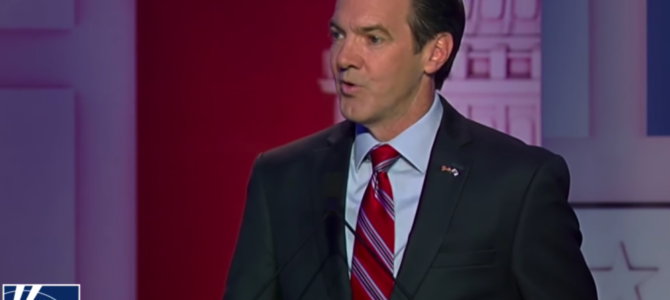
The first nationally-televised debate of the 2018 midterms aired on Fox News from Morgantown, West Virginia on Tuesday night. Often overlooked nationally, West Virginia is home to a tight, three-way GOP primary which could ultimately sway the balance of the U.S. Senate.
The hour-long debate, moderated by Bret Baier and Martha MacCallum, featured the top three candidates for the GOP Senate nomination: U.S. Rep. Evan Jenkins, West Virginia Attorney General Patrick Morrisey, and coal magnate Don Blankenship. The three are vying to unseat incumbent Democratic Sen. Joe Manchin, who is vulnerable in a state where President Trump is wildly popular.
As a West Virginian who has been avidly following the Senate race (and receiving roughly a dozen political mailers a day), I found it fascinating to finally see the candidates interact in person.
Here are five quick takeaways from the debate:
1. Most of the sparks flew between Morrisey and Jenkins.
The attorney general and the congressman tangled frequently. Morrisey repeatedly pointed out that Jenkins had spent two decades as an elected Democrat during the Clinton, Bush, and Obama years, switching parties to run for Congress in 2013. He also criticized Jenkins’ recent vote for the gargantuan $1.3 trillion omnibus spending bill, which continued federal funding for Planned Parenthood.
Jenkins, in turn, attacked Morrisey for being a native of New Jersey and implied he is a carpet-bagger (“We want people coming to West Virginia for the right reasons”). He also called into question Morrisey’s wife’s career as a D.C. lobbyist, noting her lobbying for the pharmaceutical industry. The sparring grew heated at times.
West Virginia Republicans can only hope this bruising primary won’t prove to be a gift for Manchin.
2. Most of the comic relief came from Blankenship.
As a candidate whose resume includes a year recently spent in federal prison, and who is still on probation, Don Blankenship is already far outside the norm. He seemed to embrace that role, dispensing several folksy one-liners that got a laugh from the room. When asked his opinion on the investigation by special counsel Robert Mueller, for instance, Blankenship quipped, “You know, I have a little personal experience with the Department of Justice. They lie a lot too.”
Though Jenkins is the candidate who continually talks about being a “proud West Virginian,” Blankenship is the one who looks and sounds the most like a real native. Several of his answers, particularly on foreign policy and shrinking the federal bureaucracy, came across as plainspoken common sense. His strongest debate moment was when he called for the removal of Mitch McConnell as Senate majority leader.
Of course, the elephant in the room was Blankenship’s recent conviction and imprisonment, stemming from a mine explosion that killed 29 miners. He seemed eager to talk about it, discussing the case for nearly three long minutes. While Jenkins and Morrisey saved most of their fire for each other, allowing Blankenship to avoid a lot of hard questions, it’s hard to imagine how he could survive the heat of a general election.
3. Evan Jenkins really wants you to know he’s from West Virginia.
Jenkins touted his record of support for Trump, but his primary selling point seems to be his West Virginia roots. He holds this advantage over Morrisey, who moved to the state in 2006, and Blankenship, who currently lives in Nevada. He criticized Morrisey for running for Congress in New Jersey 18 years ago, with an ad promising to fight for “Jersey values.”
“You know what?” Jenkins said. “We need somebody representing our values. You can’t change your values just because you change your ZIP code.”
Later, when asked his position on the Obama-orchestrated Iran deal, Jenkins took the first half of his response time to note that the Tennessee-themed song “Rocky Top” had been played during the commercial break, rather that the West Virginia anthem “Country Roads.” He followed this up with a lengthy comment about “West Virginia pride” before finally answering the question about Iran.
In a race where each candidate is working to convince skeptical voters that he can be trusted, Jenkins is playing the “native” card as hard as he can. It’s an appeal that resonates in a state where people often feel attacked and belittled from the outside. Still, it doesn’t answer many primary voters’ concerns about Jenkins’ reliability as a conservative.
Jenkins’ strongest moment in the debate was when he went on the attack against his former political ally and now would-be opponent. “Joe Manchin is on the Chuck Schumer team,” Jenkins said. “He’s sitting there with Elizabeth Warren, with Bernie Sanders. He’s got a 70 to 80 percent voting record with them. That’s not West Virginia.”
4. Morrisey stressed his record — and it’s a strong case.
Morrisey took every opportunity to remind West Virginia voters how hard he has fought for them during his tenure as attorney general. “I’m the only one here with a conservative record of results,” he said. “If anyone raises ‘West Virginia values’ with me, show me someone who’s done more to go after the absolute wretched excess of the Barack Obama era.”
Morrisey’s resume as attorney general includes suing and winning against Obama’s Environmental Protection Agency in the U.S. Supreme Court; blocking Obama’s executive order on amnesty; negotiating numerous interstate gun reciprocity agreements; initiating the passage of a state Pain-Capable Unborn Child Protection Act; and suing the Drug Enforcement Agency for its policies perpetuating the over-prescription of opioids. It’s a record which has led to a slew of endorsements from West Virginians for Life, several Second Amendment groups, and Senate conservatives like Rand Paul and Ted Cruz — none of which Morrisey failed to mention.
A particularly strong moment for Morrisey was when he called out his opponents for being more about talk than action:
While so many people here on the stage either abandoned the state or were on the Barack Obama team, I was literally by myself suing Barack Obama, because he threatened our way of life here in West Virginia. … When West Virginia needed a proven conservative fighter to change the abortion laws in our state, neither of these guys were around. They wouldn’t weigh in at the time. I stood up, and now we have a pain-capable law protecting the unborn.
In contrast to the telegenic Jenkins, who looks like a Southern senator from Central Casting, and Blankenship with his everyman appeal, Morrisey comes across as the scrappy, Irish-blooded fighter he undoubtedly is. If Jenkins bases his credibility on “West Virginia pride,” Morrisey bases his credibility on his record as someone who fights and wins.
5. President Trump looms large.
Trump won West Virginia by a 42-point margin, and his popularity here remains sky-high. Let’s just say that watching this debate would have been a long and excruciating hour for any member of the #Resistance. Each candidate was quick to praise the president, and to claim that he was the one best suited to unseat Manchin and help Trump drain the D.C. swamp.
With early voting already begun and the primary fast approaching on May 8, we’ll soon find out which candidate West Virginia Republicans decide they can trust with the assignment.








